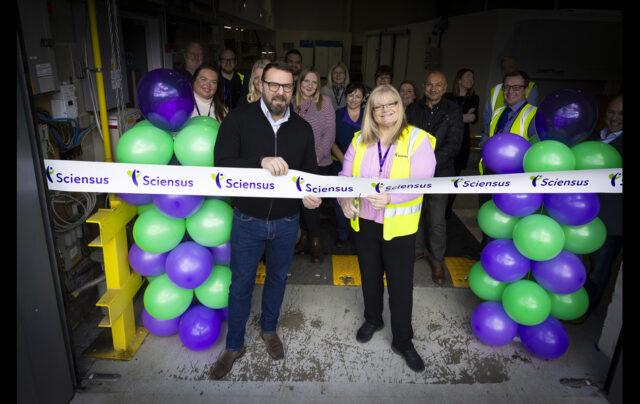How the Sciensus blood monitoring service is easing the burden on the NHS
When the NHS Commercial Team at Sciensus were approached by an NHS trust that was struggling to maintain its blood monitoring service, it led them to develop a process to communicate with the trust’s patients to help manage patient compliance with blood tests. Cayleigh Taylor and Debbie Goodwin from the team share how this scalable solution can free up capacity in the NHS and mitigate the risk of a patient’s prescription being delayed due to no bloods.
Why this service is needed
Blood testing is required in many clinical areas before a patient’s renewal prescription can be written. When a hospital or NHS trust’s blood monitoring process is not working efficiently or is under strain and a patient is not compliant with getting their blood taken, it can lead to late prescriptions and the risk of patients missing doses of their medication.
A year ago Sciensus was asked to come up with a solution that mitigated this risk to patients. The result was the creation of a trial process to write to patients and send them a text on behalf of the hospital to ask them to get their bloods done. Within three months, the trust that had been experiencing the problem saw a 30 per cent increase in adherence of patients getting their blood taken on time.
Having seen the positive outcome of the trial, Debbie and Cayleigh realised the service could work on a national level. A pilot was launched in Northampton in November 2024, to create a scalable service to ease the admin burden on the NHS. Targeted NHS workshops were held to ensure the voice of the customer was at the forefront of any solution created.

Building the service
So far, the Sciensus blood monitoring service is being used by 10,000 patients over 20 NHS trusts in the UK, and across approximately 35 different clinical specialties.
Regular workshops are held between Sciensus and the NHS to find out what struggles, barriers and challenges its teams are facing so Sciensus can put together solutions to help bring the most benefit.
Debbie said: “We did a lot of scoping workshops with the NHS to understand what would be needed for the scalable solution for managing blood test compliance to make sure we built something that was suitable. We went into it knowing it was an incremental process. This was only stage one. Using what the NHS has told us so far, we have a lot of things we can do to bolster this space and improve the service. Everything we do is driven by what the NHS tells us they need.”
Workshops are open to all home care teams, Sciensus Connect portal users, clinicians, prescribers, pharmacists and more to get a broad spectrum of the issues within each area.
How the service works
When a trust signs up to the service, it is determined which clinical areas it will be used in as it can be broken down into different specialties. Once a start date has been confirmed, all patients within the service are notified via text about the blood monitoring service and the benefit it has of keeping their service constant.
Three weeks prior to a patient’s prescription being due to be requested, Sciensus sends a text asking them to get their blood testing done if they haven’t already in preparation for the hospital writing their renewal prescription.
Feedback so far
Northampton General Hospital NHS Trust implemented their own Blood Prompt Text Service in mid 2024. Prior to implementing the service with Sciensus they collated data on how compliant patients were at getting their blood testing done. Upon implementing the service with Sciensus in November 2024, they ceased their own text messaging service and continued to monitor the compliance. The results show that switching their own text prompt service off, the level of compliance remained the same. Debbie said: “It’s been very positive so far as we’ve replaced their own service and it’s just as effective.”
Cayleigh added: “Northampton told us it was saving them time without having a detrimental effect on the patients or their workload. When we reach out to other trusts about what we can offer, the general feedback is that this sounds great and it sounds like it’s going to save time.”
Future goals and the positives for the NHS
Debbie said: “The intention is to use the foundation we have got to develop additional features based on the NHS needs, and utilising all of digital assets.
She added: “Our goal is to develop this service to ease the burden of the NHS. We want to have the data to evidence and impact on the reduction of late prescriptions and the reduction of missed and delayed medication doses. We want to positively impact the space where a patient’s delayed bloods impacts the workflow in the hospital and the urgency with which prescriptions are received and processed on our side.”
Read more on…

Blogs
Sciensus Intouch app launches injection site tracking to support patient medicine adherence
Sciensus partners with global pharmaceutical companies across Europe to deliver innovative support to enhance the care of patients. The latest…

News
Sciensus’ new depot allows for increased capacity and improved environmental and social impact
Sciensus opens new depot in Hemel Hempstead to replace a smaller facility at Kings Langley. Operations began at the end…

Blogs
How could at-home cancer treatment help reduce NHS waiting times?
A BBC News report revealed that NHS cancer treatment waiting times in England were the worst on record during 2023.…
